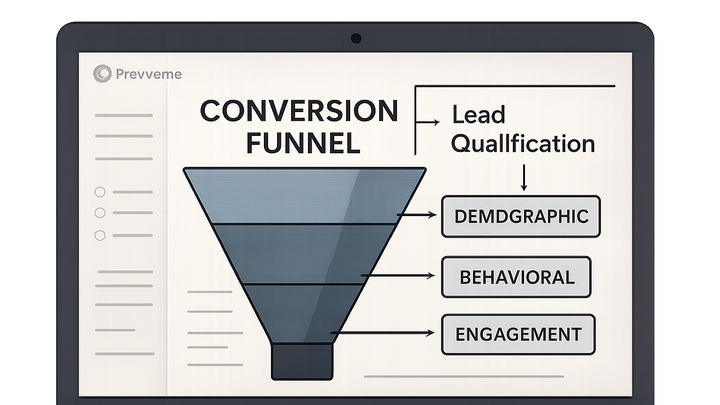Published on 2025-06-29T20:53:17Z
What is Lead Qualification? A Guide for CRO/UX/SEO
In the context of website optimization for CRO, UX, and SEO, Lead Qualification refers to the process of evaluating and segmenting incoming website visitors or sign-ups based on a set of predefined criteria. It ensures that marketing and sales teams focus efforts on prospects most likely to convert, improving resource allocation and boosting overall conversion rates. For example, using Prevue.me’s actionable critiques, you can quickly identify which visitor behaviors signal high purchase intent. Lead qualification not only streamlines your sales funnel but also enhances user experience by tailoring follow-up interactions to relevant audience segments. It’s a critical step to bridge the gap between traffic generation and revenue growth.
Lead qualification
Process of assessing and segmenting prospects based on fit and intent to boost CRO, UX, and SEO performance.
Definition and Importance
Lead Qualification is the systematic evaluation of prospects to determine their readiness and fit for your product or service. It ensures that optimization efforts target high-value visitors, improving conversion rates and user satisfaction. By qualifying leads, teams avoid wasting resources on unlikely buyers and deliver more personalized experiences to those most likely to convert.
-
Definition of lead qualification
Evaluating and segmenting visitors based on criteria like demographics and behavior to identify high-potential prospects.
-
Importance for cro, ux, and seo
Focusing on qualified leads ensures that CRO tests, UX improvements, and SEO investments yield measurable ROI.
Key Lead Qualification Criteria
Effective lead qualification relies on multiple criteria: demographic data, behavioral signals, and engagement levels. These dimensions help differentiate potential buyers from casual browsers and inform personalized follow-up strategies.
-
Demographic fit
Assesses if a prospect’s attributes align with your target audience profile.
- Location:
Geographic targeting ensures relevance to service areas and compliance requirements.
- Industry:
Aligns prospects with industries where your solution delivers the most value.
- Company size:
Tailors messaging and offerings to enterprise vs. SMB needs.
- Location:
-
Behavioral signals
Tracks on-site actions that indicate interest and intent.
- Page visits:
Frequent visits to pricing or demo pages signal purchase intent.
- Content downloads:
Downloading resources shows research-phase engagement.
- Email opens:
High open rates reveal optimal follow-up timing.
- Page visits:
-
Engagement levels
Measures the depth of interactions with your site or product.
- Time on site:
Longer sessions often correlate with genuine interest.
- Feature usage:
In-app or tool usage indicates real adoption signals.
- Repeat visits:
Returning visitors are likely evaluating more seriously.
- Time on site:
Implementing Lead Qualification with Prevue.me
prevue.me offers CRO, UX, SEO, and accessibility critiques that feed directly into your lead qualification framework. By integrating prevue.me, you capture actionable data on user behavior and site performance, mapping these insights to your criteria for a data-driven approach.
-
Setup and integration
Embed prevue.me’s script or plugin to start collecting user interaction and performance metrics instantly.
-
Analyzing actionable critiques
Use the prevue.me dashboard to pinpoint high-intent behaviors—like repeated product page visits—and tag these leads automatically.
-
Iterating and refining
Continuously adjust qualification thresholds in prevue.me based on conversion data and team feedback.
Best Practices and Common Pitfalls
A balanced approach to lead qualification maximizes conversions without excluding valuable prospects. Keep criteria transparent, review them regularly, and avoid overly strict filters.
-
Maintain clear qualification criteria
Document and share your rules across teams to ensure consistent lead handling.
-
Regularly review and update
Use quarterly audits with prevue.me insights to keep criteria aligned with market shifts.
-
Avoid over-filtering leads
Excessive strictness can discard late-stage prospects—strike a balance between precision and inclusivity.
